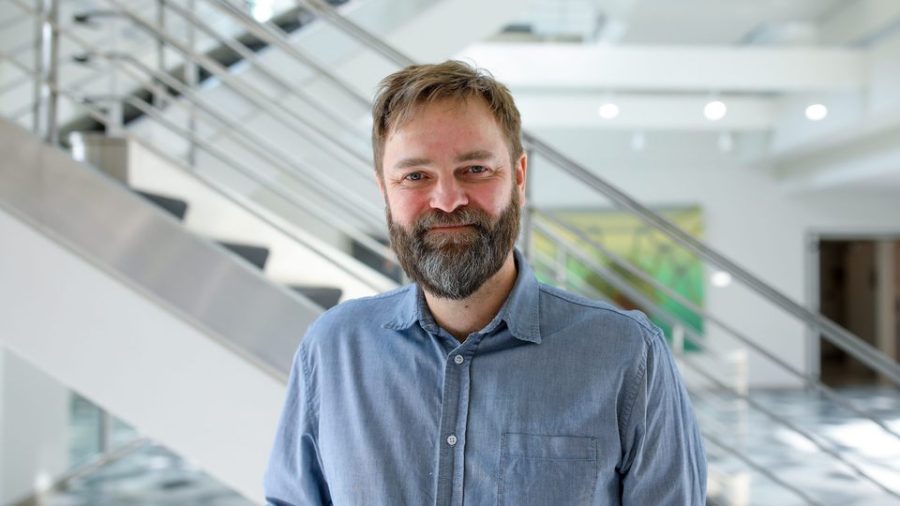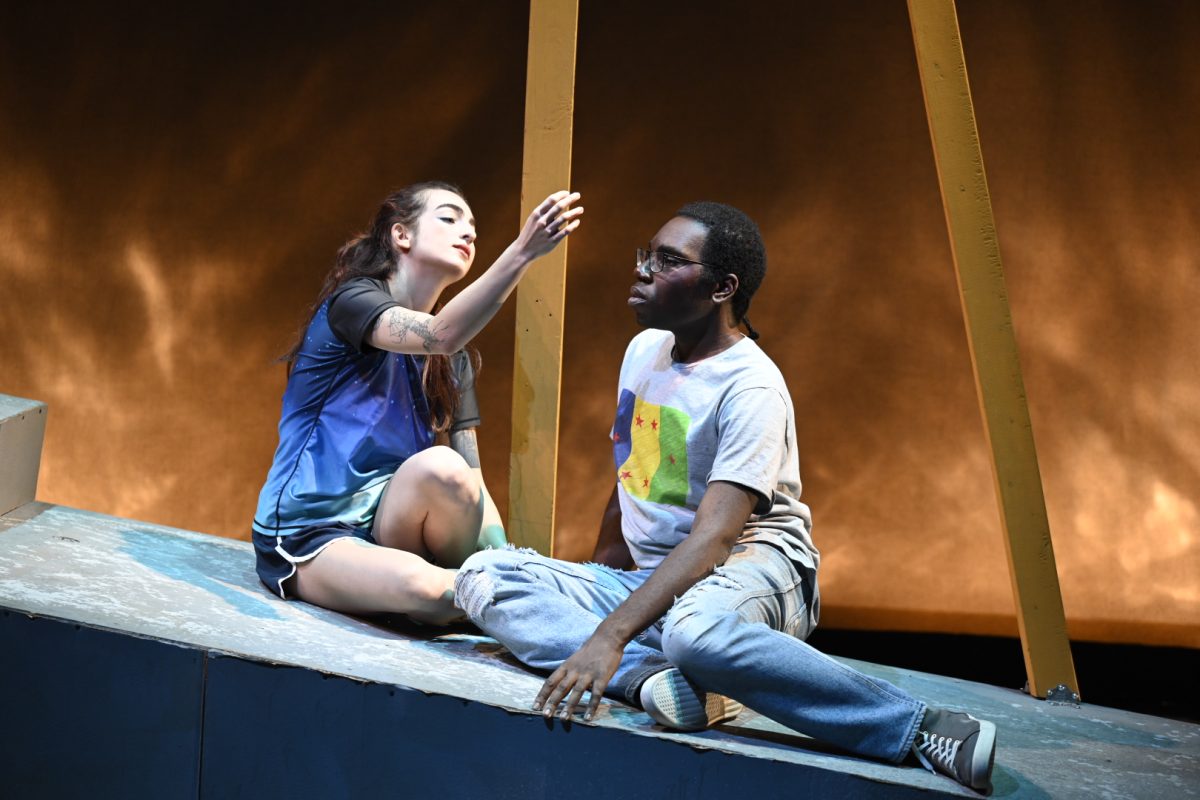“What stood out most about Nels was his imagination and willingness to take risks. Whether it was deciding to make bacon and eggs on a hot plate for lab snacks, or troubleshooting an experiment for his research project, Nels was always comfortable pushing the envelope and trying new approaches to solving problems,” said Biology Professor Stephan Zweifel, who taught Nels Elde ’95 while he was at Carleton.
Often donning thick shades and a baseball hat while driving around Utah, Dr. Elde is an unassuming figure who is changing the face of microbial research. The recipient of a MacArthur “Genius Grant” for his groundbreaking work in evolutionary genetics, Elde spoke to The Carletonian about what this award means to him and how his work in evolutionary biology is impacting the way we live.
The MacArthur Foundation aims to “celebrate and inspire the creative potential of individuals through no-strings-attached fellowships,” according to the organization’s website. Through a confidential nomination process, the $625,000 award is presented annually to between 20 and 30 Americans working in any field.
Elde, an associate professor at the University of Utah, said that the news of the award “was a big surprise, a great surprise,” and, in fact, “a little bit of a trick.” The MacArthur Foundation reached out to him via email requesting he set up a phone call to provide support to some other MacArthur fellows, but when he answered, it was revealed that he was in fact receiving a MacArthur Fellowship.
Twenty years earlier, Elde was in a biology class with Zweifel, who remembers him being a fun-loving, creative student. “The spark you see in all successful scientists, that curiosity, was always evident in him. His time commitment, the type of questions he asked and his dedication to solving a riddle speaks volumes about who he is,” said Zweifel.
Elde remembers Zweifel—who also coaches Carleton Men’s Tennis— from his time on the staff of The Carletonian, writing articles about the tennis team. “I would make up kind of fanciful quotes, not always exactly what the players and coaches were saying. I think Stephan thought it was pretty hilarious actually and that is really how we met, and I ended up working for him even after graduation.”
“Even though sometimes we think about science as sort of a recipe book, there’s really a lot of room for creativity and fun. Stephan’s incredible advice [to me] was having fun and I think that has really served me well at Carleton and beyond, from grad school to opening my lab in Utah,” Elde said.
From viral mimicry to bacterial iron piracy, Elde has published articles on evolutionary genetics that focus not only on microbes but also on human cell evolution. Dr. Brenda Bass, who is currently collaborating with Elde on a Transformative Research Award, said, “The goal of our Transformative Award is to find ways to trick cancer cells so they will kill themselves with their own immune response. We’re working on viruses themselves, some distant form of coronavirus, and we’re interested in how they evolve to build new tools. We know already that [COVID-19] is the third big one [pandemic] in recent times. Can we take an evolutionary view about how these things adapt and change and move through populations?”
Elde said, “I am really curious about the outcomes of evolution—how is it that our cells are organized and how will they be impacted by microbes? In particular, how past pandemics influenced, based on Darwinian evolution, who survives and who has kids and how that has shaped our own biology down to the cellular level.”
When asked about how the current pandemic has influenced his work now and further down the line, he said, “I think what the current pandemic does is really put a sharp focus on the impact that viruses and other microbes can have on us and in fact, even though [this pandemic] has changed our lives in all corners of the globe, from an evolutionary perspective, this is just kind of a minor blip in the radar. And I say that because our species is in no danger of, say, an extinction-level event.”
The importance of creativity in Elde’s work is evident in his MacArthur acceptance video, where he mentions his background of coming from a family of scientists, artists and ministers as one factor fueling his creative and interdisciplinary thinking. Bass echoed this passion that Dr Elde shows in his work. “As you might imagine, Nels is a wealth of creative ideas, and further, he is always up for an “out-of-the-box” party! You state your own wild idea, and he happily and immediately takes it to the next step, lending substance to the wild idea and paving the way to discovery.”
Reminiscing on his time at Carleton, Elde mentioned the impact a liberal arts education had on his work. Speaking of his freshman year writing seminar called “Health, Healing and Religion”, he said, “the foundational framework of learning was bigger. At Carleton, there’s this community where you have professors and advisors who become friends and they care about you and your professional development and your path in education, and to have that kind of support is what nurtures the creativity and the curiosity. It builds the space to take chances, to think bigger, to build bigger.”
Thanking his professors including Zwiefel as well as Mark McKone, who teaches evolution at Carleton, Elde mentioned that he is still connected to them today. “These connections are not just for four years, this is part of the community that stays with you. That is almost the magical part of being at Carleton and liberal arts, you don’t just take classes in different disciplines, but it means you are part of this community of people who care about each other. That echoes an impact that you can’t imagine, it turbocharges our education, it’s like rocket fuel. It is a great reminder in these fun times, when you win an award like this, that it is not an individual thing. It is built on the shoulders—in almost these concentric rings—of staff, professors and other students that are lifelong companions in the process.”
Now a professor himself, Elde tries to bring the excitement and fun he felt at Carleton into his own labs. He remembers a former professor warning him that lab science isn’t always great fun, depending on who you’re working with, and said he “took that as a challenge to find fun connections in work,” as well as to mentor others to do the same.
Despite his focus on research-based learning, he keeps the connections to his liberal arts education by teaching a seminar in critical thinking to his first-year students in the University of Utah’s microbiology program. “We are able to have these liberal arts style discussions and dialogues in what it means to advance science. And these are even PhD students who are working toward their dissertations.”
While laughing about Zweifel’s request to invest in an indoor tennis court at Carleton, Elde mentioned his plans to build a bridge between University of Utah and Carleton College using the resources provided by the MacArthur Foundation. “There is definitely some ongoing investment between Carleton and Utah to kind of echo the great opportunity I got at Stephan’s lab. We are in this win-win situation where all of us who are faculty [at the University of Utah] from Carleton are hoping to express our appreciation for the training, the connections and relationships we have—but also hoping to build new ones and provide new opportunities as well.”
“It is definitely a little selfish too, because we know how great Carleton students are, and we would love to have them working in our labs, advancing our science projects. And so a prize like this only helps us to build those connections even stronger,” he added.













